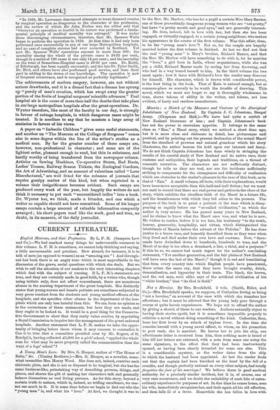Maoria : a Sketch of the Manners and Customs of
the Aboriginal' Inhabitants of New Zealand. By Captain J. C. Johnstone, Bengal Army. (Chapman and Hall.)—We have had quite a surfeit of New Zealand literature of late ; and Captain Johnstone's book has not the power to reawaken appetite. It belongs to the same class as "Ena," a Maori story, which wo noticed a short time ago, but it is more close and elaborate in detail, less picturesque and poetical, and by pointing out the present declension of the actual Maori, from the standard of prowess and natural grandeur which his story illustrates, the author lessons his hold upon our interest and fancy. We do not think Captain Johnstone has done wisely in stringing the results of his careful study of New Zealand and its native race, their- customs and antiquities, their legends and traditions, on a thread of romantic narrative. The characters are not sufficiently distinct, though he tolls us they are real, nor are the incidents sufficiently striking to compensate for the strangeness and difficulty of realisation which are obstacles to the reader's pleasure in the ease of this book, as in that of "Ena." A small volume, all facts, with their explanations, would have been-more acceptable than this half-and-half fiction ; but we must not omit to record that there are real power and pathos in the close of the story, which exhibits the cloudless faith of the Maori in a future life, and the dauntlessness with which they bid adieu to the present, The purpose of the book is to paint a portrait of the race which is disap- pearing so rapidly before our "so-called civilisation," on which the author is very severe. He has passed many years in New Zealand, and he claims to know what the Maori once was, and what he is now, Ho wishes to render, before it is too late, his testimony "to the truth, honour, generosity, hospitality, and virtue, which distinguished the• inhabitants of Maoria before the advent of the Pakeha." He has done justice to a brave race, and honestly described them as they were when they lived and died under their own laws and customs. Now, "thou-- sands have dwindled down to hundreds, hundreds to tons, and the Maori of to-day is too often a drunkard, a liar, a thief, and a perjurer."' If this bo so, we cannot feel much regret for the author's concluding statement, "Yet another generation, and the fair plains of New Zealand will have seen the last of the Maori ;" though it is sad and humiliating that from every country into which English people have penetrated,. there arises the same cry, that they have brought cruelty, drink,. demoralisation, and hypocrisy in their train. The black, the brown,. and the red man, each alike says of the artificial civilisation of his "white brother," that "its God is Gold."






































 Previous page
Previous page